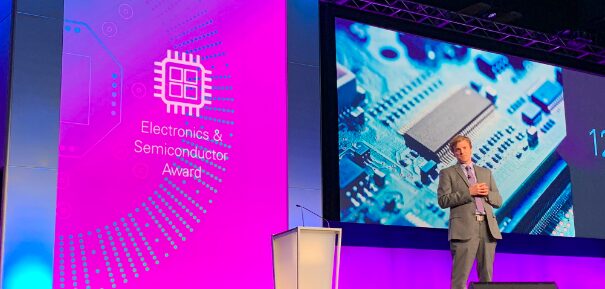Chipset production for 5G has been ramping quickly over the past six months and is expected to continue through the rest of this year, according to David Hall, head of semiconductor marketing at National Instruments.
NI used its annual NI Week event to highlight its work in millimeter wave testing, unveiling a new vector signal transceiver that supports mmWave. It both announced and demonstrated a 5G mmWave wafer probe test solution which it developed in collaboration with Tokyo Electron, FormFactor and Reid-Ashman. The direct dock probe solution “simplifies the signal path, provides the necessary signal integrity for mmWave applications and supports both top and bottom load probe applications,” NI said in a release.
The new VST debuted at NI Weekas part of demos including packaged part and wafer-level test and in validation test configurations using over-the-air measurements. The focus on production test for mmWave is a reflection of the state of the industry and the pressure on suppliers to get 5G chips to market as quickly as possible.
The spectrum engineering for mmWave and support for many different bands means that companies must conduct much more testing of semicondictors, according to Hall.
“The thing that is challenging about testing chips in the lab is, it’s very time-consuming,” he said. “The benefit of NI’s platform of instruments is to be able to reduce test time and get to market on-time.”
One of the companies NI highlighted this week was its chip customer Qorvo. Hall said that as Qorvo has positioned its front-end module for handsets in mid-band 5G spectrum, the company attributes some of its success to collaborating with NI in order to get the product to market faster. Qorvo was an early adopter of NI’s instruments, going back more than a decade, Hall said: “So they’ve come a long way in terms of how efficiently they’ve used NI’s tech. We’ve partnered with them, getting feedback and product direction, to make sure that we’re serving their needs.”
Analog Devices was another NI customer in the spotlight this week, Hall said — and it’s a company with a two-way relationship with NI. Analog Devices supplies components to NI, and in fact supplied chips for the newly announced mmWave offering — and it also uses the company’s test solutions. Because Analog Devices’ company strategy includes a focus on early market development and having products (such as 5G base station transceivers) ready before its competitors, they have testing needs ahead of those competitors as well, Hall said.
“They were ready to do 5G testing ahead of a lot of their competitors,” he said, both as a supplier to the industry and as a supplier for NI. NI’s ability to support the company in those efforts helped enable the ramp-up of sub-6 GHz 5G infrastructure, Hall added.
In general for 5G, Hall went on, “sub 6-GHz is ramping very quickly” and driving a lot of carrier network roll-outs. “We’re seeing infrastructure suppliers racing to manufacture infrastructure, so that carriers can deploy networks. It’s trickling all the way down to the semiconductors: our customer are ramping their product volumes very quickly.” That has been occurring over the past six month, Hall said, and is expected to continue throughout the rest of this year.
In addition to NI’s announcements around mmWave testing, the company also touted the latest release of its LabVIEW 2019 and LabVIEW NXG engineering software as well as its SystemLink software for test asset management as well as updating its NI Educational Laboratory Virtual Instrumentation Suite (NI ELVIS) III software.

